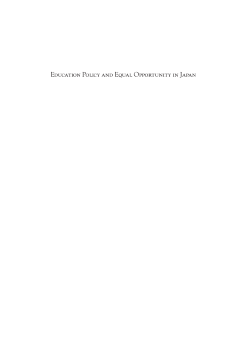
Additional Information
Book Details
Abstract
In many societies today, educational aims or goals are commonly characterized in terms of “equality,” “equal opportunity,” “equal access” or “equal rights,” the underlying assumption being that “equality” in some form is an intelligible and sensible educational ideal. Yet, there are different views and lively debates about what sort of equality should be pursued; in particular, the issue of equality of educational opportunity has served as justification for much of the postwar restructuring of educational systems around the world. The author explores different interpretations of the concept of equality of educational opportunity in Japan, especially as applied to post-World War II educational policies. By focusing on the positions taken by key actors such as the major political parties, central administrative bodies, teachers’ unions, and scholars, he describes how their concepts have developed over time and in what way they relate to the making of educational policy, especially in light of Japan’s falling birthrate and aging society.
Akito Okada is Associate Professor in the Institute of Global Studies, Tokyo University of Foreign Studies. He is the author of “Secondary Education Reform and the Concept of Equality of Opportunity in Japan” in Compare (2009); “Japan as a Prototype of the ‘Degreeocracy’ Society?” in Educational Review (2001); and “Education of whom, for whom, by whom? Revision of the Fundamental Law of Education in Japan” in Japan Forum (2002). His main research interest is Japanese educational reform in comparative context.
” Clearly written, this is a concise guide to Japan’s post-imperial history of education that highlights all the key points of post-war educational history. A glossary of Japanese terms and list of abbreviations, as well as three appendices, provide the reader with handy references.” · Journal of the Royal Anthropological Institute
“… a significant contribution to knowledge in the field of Japanese educational studies. The author provides detailed analysis of the theme of educational opportunity in post-war Japan ...[and] makes available to an audience that cannot read Japanese a wealth of detail about this key area of educational policy and practice.” · Robert W. Aspinall, Shiga University
“This is a good piece of work on history of ‘equal opportunity’ in Japanese education. It covers historical changes of education policies and educational thoughts behind them in postwar Japan, with a comparative view to the West… there are few works on this on this topic published in English.” · Takehiko Kariya, Nissan Institute of Japanese Studies, University of Oxford
